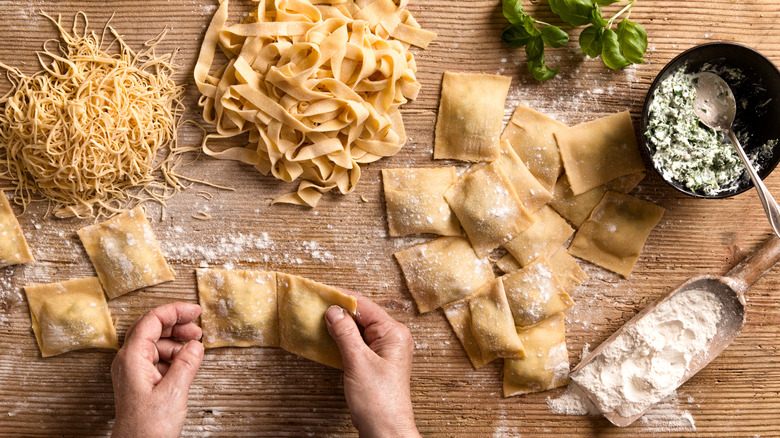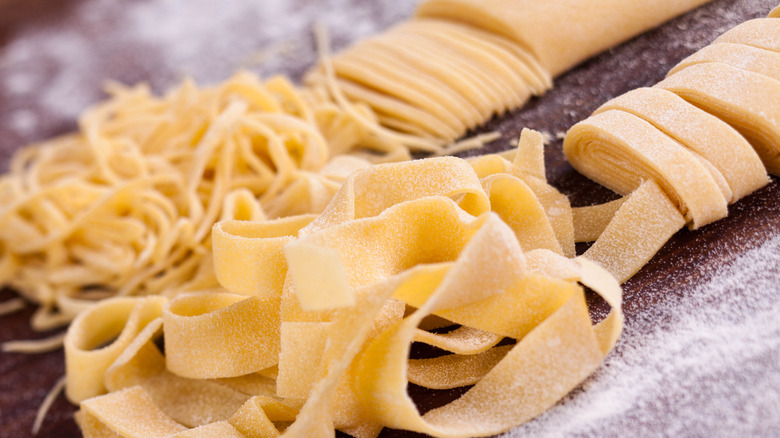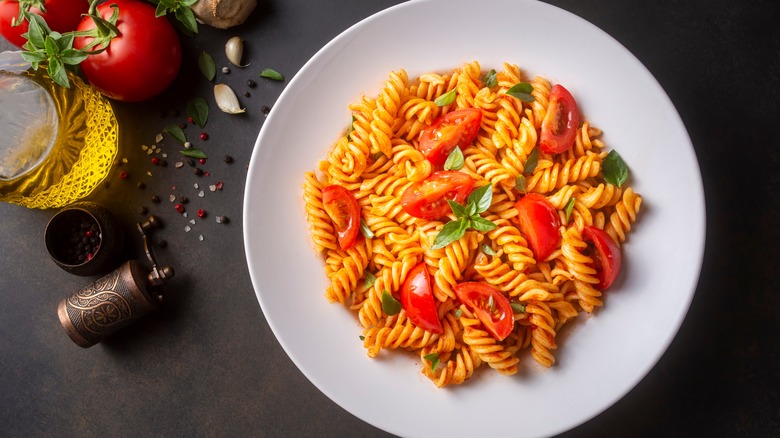Why You Should Be Careful When Tasting Raw Homemade Pasta Dough
Making homemade pasta isn't nearly as difficult as it seems — especially if you have a pasta maker. But even if not, the dough typically contains only two to three ingredients, and the only manual labor is having to roll it and turn it into various pasta shapes. With that said, there is a hidden danger lurking in raw pasta dough: foodborne illness — and doesn't matter if you omit the eggs.
While eggs are typically thought of as the most dangerous part of raw dough, your flour could potentially be housing some nasty germs as well, and handling either of these ingredients without fully cooking them puts you at risk. If you've ever eaten any kind of raw dough — including cookie dough — you're certainly not alone, but you do risk getting sick with each passing bite. The best way to ensure food safety is to make sure anything containing either ingredient in the dough is fully cooked before you consume it.
Why can raw eggs and flour make you sick?
The risk of salmonella from raw eggs is low, but it's not zero. That means each time you handle a raw egg, you risk potential exposure to salmonella, which, if consumed, leads to symptoms like cramping, diarrhea, and fever. Healthy individuals don't often die from food poisoning, but those with compromised immune systems could.
The CDC reports that eggs get infected with salmonella when they're laid by chickens and then come in contact with the chicken's droppings. If you unknowingly use an infected egg to make your pasta dough, you're setting yourself up for several days of discomfort. Interestingly, your risk of salmonella tends to be lower with grocery store eggs than with fresh eggs, because eggs are washed prior to landing on store shelves.
Flour, on the other hand, is also raw despite not seeming like it. Since flour is grown outside and not cleaned before it's sold, the FDA says it's exposed to bacteria that won't be eliminated before it hits shelves. As a result, you run a similar foodborne illness risk to raw eggs as raw flour could also contain E. coli. While not everyone adds eggs to their pasta, flour is an absolute must. And in either case, raw pasta dough could be bad news.
Is boxed pasta also raw?
People may forego fresh pasta because boxed pasta has a long life in your pantry. Technically, boxed pasta is also uncooked pasta. The pasta has been dried, giving it the hard texture that differentiates it from the fresh kind, but it's still raw and should be heated before being eaten.
With that said, most dried pasta is pasteurized before it's dried in specialized chambers, meaning the likelihood of bacterial growth is extremely low. So the risk is, for all intents and purposes, almost zero. Of course, dried pasta is somewhat difficult to eat due to its texture, so you shouldn't make a habit of consuming it regardless of whether it comes with a risk of bacterial infection or not.
Bacterial contamination from flour is not uncommon: Back in April 2023, General Mills recalled packages of its flour due to a salmonella outbreak linked to the products after salmonella was found in a routine sampling. In terms of eggs, the risk of contracting salmonella is an estimated 1 in 20,000 eggs.


